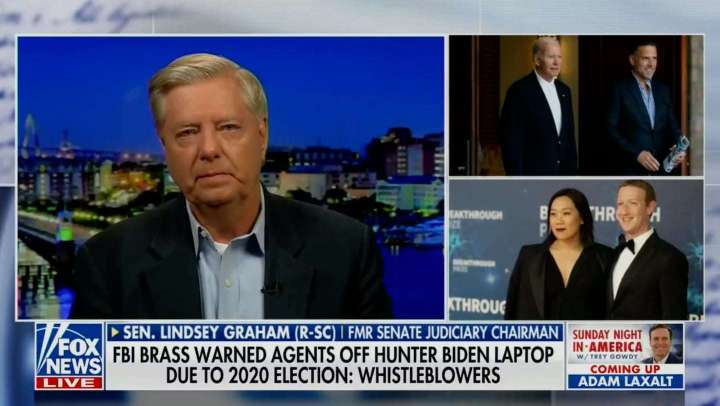It is generally understood that any indictment of former president Donald Trump would be rejected out-of-hand as corrupt by many of his most fervent supporters. There are further widespread worries that some of those supporters might engage in acts of violence in response.
Trumpworld walks a line between predicting violence and threatening it

There’s an obvious parallel here: Trump and his allies repeatedly insisted that the 2020 election was tainted and, on Jan. 6, 2021, his supporters violently pushed past law enforcement and overran the Capitol.
That this risk exists is unquestionably a complicating factor for the Justice Department as it picks its way forward in its investigation into Trump. Attorney General Merrick Garland reportedly spent weeks considering the Mar-a-Lago search before ultimately approving it, a consideration that certainly included the anticipated response.
But there is an important difference between understanding the existing threat and leveraging it.
In an interview on Fox News Sunday evening, Sen. Lindsey O. Graham (R-S.C.) rationalized why Trump supporters would be furious at an indictment.
“There’s a double standard when it comes to Trump,” Graham told host Trey Gowdy. He articulated this “double standard” in familiar ways, including disparaging the investigation into Russian interference. “I’ll say this,” Graham continued, referring to Gowdy’s former role leading the House investigation into Hillary Clinton’s use of an email server while secretary of state as part of the probe of the 2012 terrorist attack in Benghazi, Libya, “if there’s a prosecution of Donald Trump for mishandling classified information after the Clinton debacle, which you presided over and did … a good job, there’ll be riots in the streets.”
Before the end of his interview, Graham returned to this point.
“If they try to prosecute President Trump for mishandling classified information after Hillary Clinton set up a server in her basement,” Graham said, “there literally will be riots in the street. I worry about our country.”
Gowdy agreed.
So did Trump. Soon after the segment aired, Trump shared a clip of it on Truth Social, without comment.
Now the question becomes: why? Why did Graham reiterate his point about “riots” twice? And why did Trump decide to share it with his followers on the social-media platform he runs?
Graham was stating that he understood the aftermath of an indictment would be likely violence — which, again, we knew. So we arrive in a grayer area, differentiating between the warning of action and the rationalization of it. Graham’s angry, pointed declaration of what would come was predicated on the idea that riots would in some way be justified, that a universe of Trump supporters who have come to understand investigations as unwarranted would understandably engage in violence.
Trump, eager to throw any roadblock in front of a criminal probe, readily amplified that suggestion. Where Graham was rationalizing possible violence, Trump appeared to be threatening it. And even recent history suggests that when Trump nods at violence or unrest, some part of his base takes him very seriously.
One effect of Graham’s comments on Sunday night is to give any acts of violence or outrage moral cover. We’ve seen this before. One response to the riot at the Capitol on Jan. 6 was that the left had engaged in a spate of violence the prior summer, compared to which the Capitol riot paled. It was an effort to minimize the violence itself. But the moral predicate for the riot — this false idea that the election was tainted — was well-established on the right. The response was seen as excessive, but understandable. Even as he appeared to break with Trump in the hours after the attack, Graham himself repeated false claims about the election results, as though there were valid questions about Biden’s win.
We must note that this attempt to rationalize potential violence in advance is based on a view of law enforcement’s actions that’s deeply rooted in false or exaggerated right-wing narratives. That the 2020 election results were suspect, that the Russia probe lacked a basis, that President Biden’s son Hunter faces no federal probe, as Graham suggested: all of these are articles of faith on Fox News and in the right-wing media universe but each is false or dubious. In other words, Graham’s explanation for why we might expect violence is rooted in false claims that he himself was elevating and validating.
It’s worth asking where this “rioting” might unfold. There are a lot of Trump supporters in blue states and in cities. (More people voted for Trump in Los Angeles County than voted for him in half of the states in the country.) It seems unlikely, though, that a Trump indictment would spur a demonstration in the heart of a major American city. Unless, of course, there’s a triggering action. Unless there’s a court hearing in D.C. or a warrant being served in Florida. What made the Capitol attack happen as a riot was a call by Trump and others to come to D.C. on that day. Otherwise, the possible violent response to a Trump indictment would be stochastic, to use a weirdly in-vogue descriptor: sporadic and relatively isolated. The sort of attack that the Department of Homeland Security warned about even while Trump was still president.
In response to a question from The Washington Post, Graham spokesman Kevin Bishop described the senator’s comments as “predicting/forecasting what he thinks will happen.” That’s certainly true. But this risk was understood before Graham articulated it on Fox News. So why articulate it there?
Again, he was obviously doing so as a warning: if the government takes this step, it is the government that is responsible for what follows. If Trump is indicted, we can expect violence and it’s the government’s fault for bringing the indictment.
An argument that Trump wanted to make sure that his millions of Truth Social followers heard. It wouldn’t be their fault.






